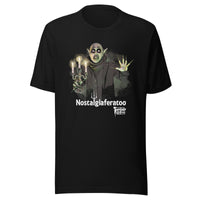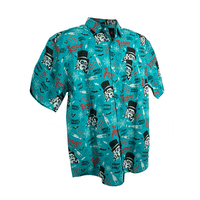6 episodes of Dragnet that prove Boomers were once the rebellious younger generation
Long hair and beads were no match for a stern Joe Friday lecture.

The police procedural Dragnet, was a show that wore its morality on its sleeve, particularly the 1960s reboot. It dealt with many serious topics pulled from real life, as it famously stated at the beginning of each episode.
Episodes often involved teenagers and young adults, those born in the 1940s and '50s, widely known as Baby Boomers.
Today, Boomers are the elder members of society, constantly contrasted with Millennials in the media. But back then, Boomers were just beginning to enter adulthood, and Dragnet proves that the generation gap between the Greatest Generation and Boomer was eerily similar to the generation gap between Boomers and Millennials. Jack Webb as Sgt. Joe Friday always had a lecture ready to set "kids today" straight, whether they were portrayed as delinquents, radicals or just goofy hippies.
Here are six episodes that show Boomers were once the rebellious youngsters that elders looked down on.

Watch Dragnet on MeTV!
Weekdays at 5:30 AM & 6 AM
Saturdays at 5:30 AM
*available in most MeTV markets
1. "The Big Departure"

A group of "juveniles" rob a market, a drugstore and a hardware store. They take a variety of food, some basic medical supplies, and simple tools like axes and shovels. It appears they’re planning to live on their own. Sgt. Friday notices one thing they didn’t take: soap. Friday and Bill Gannon bring in three boys for questioning. When asked where they live, one replies, "The world, the universal refuge of human kindness and love." Friday and Gannon then remind the boys that there's no way their utopian dream will succeed — and that they don’t know anything about the real world. He also says their generation has no patience. "You’re in a hurry, you’ve grown up on instant orange juice," as he puts it. What would he have said about Google?
2. "Forgery: DR-33"

Someone is using forged checks. Friday and Gannon speak to the stores that were victimized. In one, they remark on a young employee's choice of wardrobe. "I’ve got more material in my handkerchief then she has in her entire dress," Gannon observes. Later, they meet a hippie informant, Thompson, inside a mausoleum. Bing Crosby's son, Gary, who had a recurring role on Adam-12, played the hippie, pictured here. Friday and Gannon ask the informant what he does for a living, to which he replies, "Well, for a living, man, I live. Period. I meditate, ponder the universe, I commune with the dead." He directs them to a rundown hippie den complete with sitar music and many cats. The episode ends with Thompson's wife getting charged for the forgeries. Thompson decides to shave his beard, cut his hair, and become a productive member of society. Friday greatly approves.
3. "Juvenile: DR-05"

This episode sees Friday and Gannon manning desks in Juvenile Division. They deal with many different cases including a lost baby. One suspect brought in is a 15-year-old who calls himself "Prince George." He wears beads around his neck and babbles about achieving nirvana. Eventually, his parents show up and his father is furious, telling his mother and Friday, "How many times have I told him to cut his hair? How many times have I told him to get rid of those feminine beads and start looking like a man? How many times have I told him to stop wearing those asinine monkey suits and start dressing like a man?" Friday explains that a father-son relationship is akin to a business partnership and the father, "Is the senior member of the firm."
4. "The Starlet"

While most of this episode deals with the dark underbelly of Hollywood, there is one scene involving a young Baby Boomer that is full of hip sixties lingo. Friday and Gannon meet 18-year-old Jo-Elle (Jo Ann Harris) at The Flower Pot, an espresso café. After calling them "the man" and "the fuzz," she talks about a friend who ran away from home. "Look, I’ll put it down for you if you can pick up on it. I woulda blown that scene years before she did. I don’t blame her for splitting." The café has colorful chairs and a giant fake sunflower decoration. Ambient sitar music throughout the entire scene completes the ambience.
5. "B.O.D. DR-27"

As in other episodes, this one entails Friday and Gannon dealing with various problems at a specific office, this time the Business Office Division. Those problems include a diabetic drunk and an imminent tidal wave. Another scene involves Friday telling off some young protesters. They ask why they can’t protest inside the building and Friday says there are laws against it. The young woman says the laws are there, "To persecute young people and stifle dissent." Friday cites section 602J of the California penal code telling them they can’t obstruct the business inside the building. He tells them they can protest outside as long as they, "Don’t poke anyone in the eye with those signs."
6. "The Big Kids"

A wave of shoplifting has hit the L.A. area. It's up to Friday and Gannon to find out why. Over the course of their investigation, they discover that the cause, at least in part, is due to groups of teenagers all stealing clothes together. The detectives bring in the members of one such club and question them. The teens call themselves "The Mod Squad" and have a rule that you have to steal at least $20 worth of merchandise in order to join. The leader of the group, Audie, tells Friday, "Are you gonna bust us or just bore us to death? I mean, man, you’re interrupting our education. How’re we ever gonna grow up to fight wars and pay taxes if cops keep playing games with us." When Friday calls him a thief, he retorts,"“Now, that’s for you to prove, baby. That’s your bag, not mine." Friday then tells them a story about a kid who started with shoplifting but eventually found himself involved in a murder. That's likely to happen to them sooner or later, Friday implies.







33 Comments

If he was meant to be "comedy relief", he failed miserably.
Harry Morgan was much funnier as Col Potter on M*A*S*H.
Michael Burns played an entitled punk who painted half his face blue and the other half yellow, while stoned on pot and acid--which he also sold to others.
The episode ended with "Blue Boy's" death from a fatal OD.
I wish MeTV would resurrect the original series from the '50's. I bet that was more realistic than the reboot--and much grittier.
Down with the man!
https://cdn8.openculture.com/wp-content/uploads/2014/11/dragnet-1.png



























.jpg)





